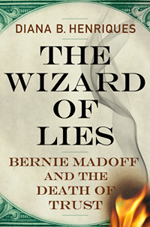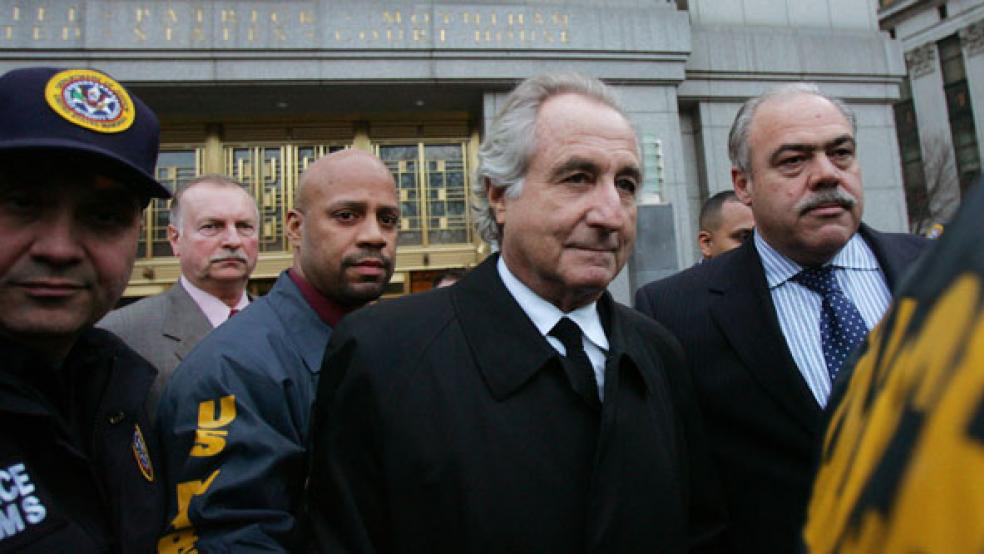He may be behind bars serving a 150-year sentence in federal prison for the $65 billion Ponzi scheme that destroyed the financial lives of thousands of people – but Bernie Madoff hasn’t changed his wily ways.
Diana B. Henriques, author of The Wizard of Lies: Bernie Madoff and the Death of Trust (Times Books/Henry Holt, $30), told The Fiscal Times in an interview this week that Madoff still has the “magic” that enabled him to create what has been called the largest Ponzi scheme in history. Just a few months ago, he promised Henriques the moon – or the journalistic equivalent of it – and then conned her.
“He told me, ‘Don’t worry, Diana, I’m not talking to other reporters. I won’t let any other interviews get ahead of your book,’” Henriques says. She was the first reporter to interview him in prison – and did so twice, in August 2010 and in February 2011 – and she’s also maintained contact with him through letters, emails, and phone calls.

They had an agreement. Then – wham. “In February 2011, as I’m interviewing him – as I’m holding a printed email in my lap that says, ‘Don’t worry, Diana, I won’t let anything come out before your book’ – I learn that he’s broken the embargo. Of course he’d been talking to other reporters.” He was negotiating with New York Magazine and with The Financial Times, she learned. Henriques quickly recovered, determined not to be scooped, and her interview with Madoff ran in The New York Times the next day.
The Fiscal Times (TFT): What surprised you most about meeting Madoff?
Diana B. Henriques (DBH): I’ve covered other Ponzi schemers in my career, and typically they’re very charismatic – the most charming person in the room. Madoff was not. He’s very calm, very quiet. He makes you feel like you’re the most charming person. And since you’re so bright and wonderful, why would you ever doubt your wisdom in trusting him?
TFT: Yet even when people were suspicious about the returns they were seeing on their investments, time and again he was able to reassure them. How?
I lost all your money,’ Madoff bought
their investments back at the price
they’d paid. That was in 1962.”
DBH: He had a gift for inspiring confidence. It served him well in his legitimate business, I must say. It’s what made him a trusted advisor to the SEC for many years; it’s what gave him stature in industry circles and organizations.
TFT: He first turned to deceit as far back as 1962, you say.
DBH: In 1962 he invested a small group of clients’ money in newly issued, over-the-counter stocks, a very reckless category. The market hit an air pocket and the stocks went to almost nothing. The clients, mostly family and friends, lost everything. But rather than say, ‘Listen, I did a foolish thing, I lost all your money,’ he bought their investments back at the price they’d paid.
TFT: So they came through it.
DBH: And he got away with it. Everyone else was losing money. But they said, ‘Wow, Madoff is a genius.’ It laid the foundation for all that came later in his life of crime. I can’t say that it was the start of the Ponzi scheme, though.
TFT: But you say the Ponzi scheme started far earlier than Madoff admits.
DBH: The best evidence suggests that the Ponzi scheme was probably in place in the mid 1980s on a large scale. He says it didn’t begin until 1992. But I asked him about the year 1987. His legitimate firm came through the crash of 1987 pretty well, but his big investors were frightened by the market’s volatility and wanted to take substantial amounts of money out of their accounts. Madoff had trouble meeting the withdrawals. He was upset. At just that moment a huge wave of hedge fund money came into his hands from offshore accounts. I said, ‘Bernie, wasn’t it just the tiniest bit tempting to take some of that money and give it the old-time investors to cover their withdrawals?’ ‘Oh, no,’ he said. ‘No.’ He flatly denied the Ponzi scheme started then. But you can see why I’m suspicious.
TFT: Has he read your book?
DBH: A copy has been sent to him. I have no idea if he’s gotten it or seen it. I do know he didn’t like the title. He sent me an email saying he was very disappointed, that it was too sensational I replied, ‘Bernie, you must have known that any book about your crime was going to have the word lies in the title somewhere.’
TFT: Were there questions he refused to answer?
DBH: In February he brushed off any questions about his son Mark’s death. He did talk about it later to The Financial Times which probably benefitted from being a little farther removed from the event.
TFT: What about his wife, Ruth, and his other son, Andrew – did he talk about them?
Ruth she had to stay with me. But
somehow she found the compassion.’
DBH: In our first interview I asked him if he regretted Ruth’s decision to stay with him after his arrest, given how much vitriol came her way as a result. He started to cry. He broke down. He said, ‘I didn’t tell her she had to stay with me. But somehow she found the compassion.’

TFT: Does Ruth still visit him?
DBH: She had been visiting him last fall. My confidential research into the family dynamics indicates that after Mark’s death, it’s been very, very difficult for them. My personal feeling – just a guess – is that Madoff would almost rather Ruth abandon him now if it would help restore her relationship with Andrew and her grandchildren.
TFT: You say he was baffled that people thought his family was involved in his crime.
DBH: He knew they would be financially and socially ruined – he’s not naïve – but he didn’t expect they would be accused of being accomplices.
TFT: Your conclusion about their guilt or innocence?
DBH: I conclude they did not know. I cannot find any evidence that they knew about his crime until he confessed to them in December of 2008. Here we are two-and-a-half years later. No charges have been brought against them.
TFT: Can people ever be sure they won’t be swindled by the next Bernie Madoff?
DBH: You can never be sure of that. But we overestimate our ability to recognize risk, and to make gut judgments about who is trustworthy and who isn’t. It’s partly because managing our finances is more complicated than ever. And it’s scary. We’re desperate for someone to help us. If we’re going to invest on trust, we should invest in an arena that’s as tightly regulated as possible. Remember: Madoff was running an unregistered secret hedge fund run by an unregistered investment advisor who didn’t provide any paperwork. In what universe is that a safe investment for a middle-class investor? I talked to people who were wiped out. It’s tragic. I gently asked them, ‘Why Madoff? Why not a bank CD, or a public mutual fund? This was money you could not afford to lose.’
TFT: And what did they say?
DBH: ‘Oh, well, I couldn’t make enough money with those.’ So they trusted Bernie, and they had all their eggs in one basket – yet the first rule of investing is ‘diversify.’
TFT: You say regulators today are asking the wrong questions. Why?
DBH: They’re asking, ‘How can we give more tools to people so they can protect themselves?’ But the public doesn’t want tools. They want regulators to protect them. There’s a disconnect here. We need to stop thinking the fine print is going to make us safer. Another idea is to require investment advisors and money managers to keep assets with an independent third party, like a custodian bank. This was proposed after the Madoff scheme by an esteemed law professor, Jack Coffey, who testified to Congress and said that if we did that, it would help prevent future Ponzi schemes. But small money managers opposed it, thought it would be too expensive, too burdensome. The idea didn’t get traction. The SEC decided not to do it. We don’t have that simple protection.
TFT: Individual investors should do what, then, in your view?
DBH: They should ask their money manager, ‘Do you use an independent third-party custodian?’ And if the answer is no, they should get up and walk right out the door.
TFT: Will you stay close to the Madoff story – and stay in touch with him?
DBH: I’ll keep an eye on how the enormous legal issues stemming from the Madoff case play out. As for Madoff himself, I just got an email from him a few days ago. Whether he wants to stay in touch with me after reading my book – that I don’t know.
Related Links:
Madoff Said Picower May Have Suspected Fraud, Henriques Writes (Bloomberg BusinessWeek)
Hoboken Author of Bernard Madoff Book Takes Part in Q&A Session (NJ.com)





